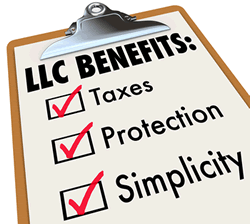 Starting a business is incredibly exciting, but it can also be especially dangerous for the owners and investors. The entire enterprise could come crashing down at any moment, even if every aspect of the business is executed to the T. Every business is a risk, but fortunately, that doesn’t mean entrepreneurs have to assume that risk with their personal finances. The fastest and easiest way to ensure the safety of personal assets is the formation of the LLC — but what exactly is an LLC, anyway?
Starting a business is incredibly exciting, but it can also be especially dangerous for the owners and investors. The entire enterprise could come crashing down at any moment, even if every aspect of the business is executed to the T. Every business is a risk, but fortunately, that doesn’t mean entrepreneurs have to assume that risk with their personal finances. The fastest and easiest way to ensure the safety of personal assets is the formation of the LLC — but what exactly is an LLC, anyway?
What Does Limited Liability Mean?
Perhaps like it sounds, “limited liability” indicates that the business’s owner is not personally responsible (or liable) for the organization, in terms of either debts or obligations, in excess of what he or she initially invested in the endeavor. A company with limited liability is treated as a separate entity from its owners and constituents. Therefore, if an LLC is sued, only those assets belonging to the business are at risk; any of the owner’s personal assets, like houses, cars, or retirement accounts, are safe. The assurance of limited liability is one of the primary reasons most entrepreneurs seek incorporation, and the simple terms of LLCs grant them this boon without much fuss.
How Long Does an LLC Last?
Though it takes just a few minutes to form an LLC using the proper forms and fill-in software, an LLC can operate nearly indefinitely without an alteration to its incorporation status. In most jurisdictions, after certification and filing of a business’s incorporation documents, there is very little other entities can do to shut it down. In extreme cases, the government can order the dissolution of an LLC if the courts are presented with substantial evidence that its operations are illegal in some way. More often, LLCs will dissolve only when its founding members agree to — or when the business can no longer sustain itself — which means an LLC basically as an unlimited lifespan.
What Types of Businesses Can Become LLCs?
Basically any type of business can coalesce into an LLC. It doesn’t matter whether the business sells toxic chemicals or teddy bears — any business can be risky, which means any business owner should seek the shelter of an LLC.
The major exceptions are businesses that require licensing to operate: law firms, doctors’ offices, architecture firms, accountant firms, and others. Professionals such as these must instead file for professional limited liability companies (PLLCs) in most states in the U.S. Generally, PLLCs afford the same protections as an LLC — separation of business assets and personal assets — which is to say that incorporation into a PLLC does not protect professional business owners from malpractice claims or the like.
Additionally, many states prevent financial institutions like banks, trusts, and insurance companies from forming LLCs. Instead, entrepreneurs in these fields must seek a different type of incorporation.
Why Should I Form an LLC?
Incorporation is perhaps the smartest first step to doing business, and an LLC is the cheapest, fastest way for an entrepreneur to safeguard him- or herself against personal financial harm.
Still, some businesses stand to gain more than others when it comes to an LLC’s protections. In particular, enterprises that are dangerous or expensive, and thus more likely to be sued or accrue debt, benefit from the protections of being an LLC or corporation. In addition, entrepreneurs who claim an abundance of personal assets should look to the limited liability of an LLC. However, shielding oneself as much as possible from the financial hazards of a business is always wise.
Why Should I Not Form an LLC?
Of course, there are a couple downsides to LLCs, mostly regarding taxation. Entrepreneurs reliant on investments for initial funding should be wary of the following facts about LLCs:
- Some investors don’t like LLCs. Because an LLC is a pass-through entity (meaning business taxes appear on individual tax files) some investors don’t like LLCs because they complicate their tax season.
- Some investors can’t support LLCs. Other investors, like those who use venture funds, cannot invest in LLCs because business income would negate their tax-exempt status.
- Taxation can get complicated fast. An LLC that does business across borders may force individual filing in more than one state, and learning additional tax forms is grueling.
What Do I Need to Form an LLC?
Where there is one person who wants to start a company, there is a way. In most states, it takes only four steps to form an LLC:
- Think of a business name. Most often, this is the most exciting step. The name must be available and unused by another entity.
- File paperwork. An LLC’s Articles of Organization (also known as Certificate of Formation or Certificate of Organization) should be complete and accurate.
- Write a business plan. Some states require entrepreneurs to submit an operating agreement that describes how the business will run, which is a valuable report.
- Publish a notice. Additionally, some states require entrepreneurs announce their impending LLC using the newspaper. This can be exciting, if a little silly.


